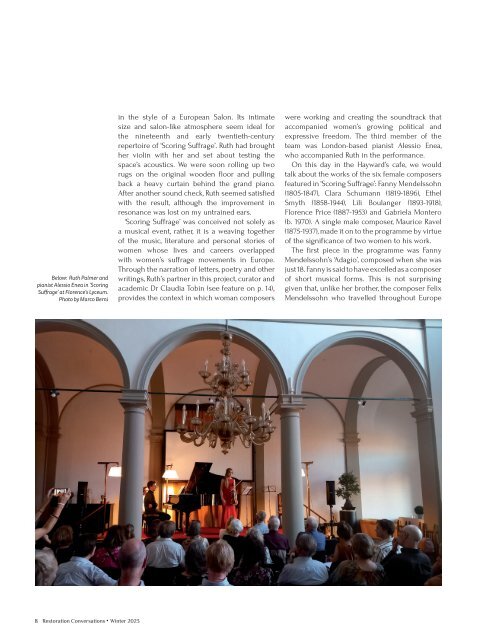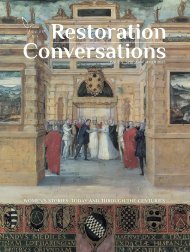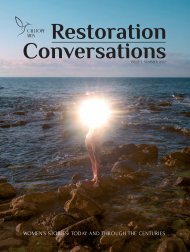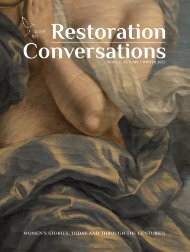Winter 2023
Restoration Conversations is a digital magazine spotlighting the achievements of women in history and today. We produce two issues a year: Spring/Summer and Fall/Winter
Restoration Conversations is a digital magazine spotlighting the achievements of women in history and today. We produce two issues a year: Spring/Summer and Fall/Winter
You also want an ePaper? Increase the reach of your titles
YUMPU automatically turns print PDFs into web optimized ePapers that Google loves.
Below: Ruth Palmer and<br />
pianist Alessio Enea in ‘Scoring<br />
Suffrage’ at Florence’s Lyceum.<br />
Photo by Marco Berni<br />
in the style of a European Salon. Its intimate<br />
size and salon-like atmosphere seem ideal for<br />
the nineteenth and early twentieth-century<br />
repertoire of ‘Scoring Suffrage’. Ruth had brought<br />
her violin with her and set about testing the<br />
space’s acoustics. We were soon rolling up two<br />
rugs on the original wooden floor and pulling<br />
back a heavy curtain behind the grand piano.<br />
After another sound check, Ruth seemed satisfied<br />
with the result, although the improvement in<br />
resonance was lost on my untrained ears.<br />
‘Scoring Suffrage’ was conceived not solely as<br />
a musical event, rather, it is a weaving together<br />
of the music, literature and personal stories of<br />
women whose lives and careers overlapped<br />
with women’s suffrage movements in Europe.<br />
Through the narration of letters, poetry and other<br />
writings, Ruth’s partner in this project, curator and<br />
academic Dr Claudia Tobin (see feature on p. 14),<br />
provides the context in which woman composers<br />
were working and creating the soundtrack that<br />
accompanied women’s growing political and<br />
expressive freedom. The third member of the<br />
team was London-based pianist Alessio Enea,<br />
who accompanied Ruth in the performance.<br />
On this day in the Hayward’s cafe, we would<br />
talk about the works of the six female composers<br />
featured in ‘Scoring Suffrage’: Fanny Mendelssohn<br />
(1805-1847), Clara Schumann (1819-1896), Ethel<br />
Smyth (1858-1944), Lili Boulanger (1893-1918),<br />
Florence Price (1887-1953) and Gabriela Montero<br />
(b. 1970). A single male composer, Maurice Ravel<br />
(1875-1937), made it on to the programme by virtue<br />
of the significance of two women to his work.<br />
The first piece in the programme was Fanny<br />
Mendelssohn’s ‘Adagio’, composed when she was<br />
just 18. Fanny is said to have excelled as a composer<br />
of short musical forms. This is not surprising<br />
given that, unlike her brother, the composer Felix<br />
Mendelssohn who travelled throughout Europe<br />
8 Restoration Conversations • <strong>Winter</strong> <strong>2023</strong>





